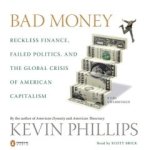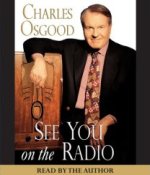|
|
Audio Book News
By Jonathan Lowe
|
May 2008
AUDIO BOOK REVIEWS
by Jonathan Lowe
 Economic commentator Kevin Phillips spills the Navy beans on the true cost of our reliance on oil in BAD
MONEY - Reckless Finance, Failed Politics, and the Global Crisis of American Capitalism. If you're looking
for an explanation as to why the dollar is falling today, and how the housing crisis escaped notice until the
bubble burst in August of 2007, this is audiobook to hear. Essentially, you can thank our deeply flawed
financial services industry, underpinned by a deluded public addicted to debt and unlimited oil reserves, for
what may be the end of America as a Superpower. Phillips outlines how we've stumbled into this nightmare
scenario, in which foreign oil producers have strategically substituted the Euro for the Dollar in an era
of falling supply and increasing demand. Add a war of occupation, and our resulting loss of respect has us
paying full price even to fuel the military vehicles used to "liberate" the Iraqis. Meanwhile, says Phillips,
"moving money around" became our biggest industry at home, with real estate speculators encouraging a casino
mentality - (the delusion of getting something for nothing.) When the house of cards finally fell, the loan
sharks, wielding their exotic financial instruments, then moved in to break some knees. As though to add
insult to injury, the Fed is now stepping in to bail out those banks whose feeding frenzy was most horrific,
while letting manufacturers continue to go belly up. The result? China is set to take our place on the world
stage, and to pollute the air more than we did in the American Century, (which was the 20th.) Scary? As
narrated with provocative urgency by Scott Brick, it's clear that Stephen King and James Patterson have
nothing on this. (Penguin Audio; 9 1/2 hours unabridged)
Economic commentator Kevin Phillips spills the Navy beans on the true cost of our reliance on oil in BAD
MONEY - Reckless Finance, Failed Politics, and the Global Crisis of American Capitalism. If you're looking
for an explanation as to why the dollar is falling today, and how the housing crisis escaped notice until the
bubble burst in August of 2007, this is audiobook to hear. Essentially, you can thank our deeply flawed
financial services industry, underpinned by a deluded public addicted to debt and unlimited oil reserves, for
what may be the end of America as a Superpower. Phillips outlines how we've stumbled into this nightmare
scenario, in which foreign oil producers have strategically substituted the Euro for the Dollar in an era
of falling supply and increasing demand. Add a war of occupation, and our resulting loss of respect has us
paying full price even to fuel the military vehicles used to "liberate" the Iraqis. Meanwhile, says Phillips,
"moving money around" became our biggest industry at home, with real estate speculators encouraging a casino
mentality - (the delusion of getting something for nothing.) When the house of cards finally fell, the loan
sharks, wielding their exotic financial instruments, then moved in to break some knees. As though to add
insult to injury, the Fed is now stepping in to bail out those banks whose feeding frenzy was most horrific,
while letting manufacturers continue to go belly up. The result? China is set to take our place on the world
stage, and to pollute the air more than we did in the American Century, (which was the 20th.) Scary? As
narrated with provocative urgency by Scott Brick, it's clear that Stephen King and James Patterson have
nothing on this. (Penguin Audio; 9 1/2 hours unabridged) |
 Next, actor John Rubinstein's long association with clinical psychologist turned mystery novelist Jonathan
Kellerman continues in COMPULSION, a thriller featuring (appropriately enough) psychologist Alex Delaware,
along with his own LAPD associate and sidekick, Milo Sturgis. On this outing the pair hunt a serial killer
whose M.O. includes stealing luxury sedans in upscale L.A. for murders in the city's seedier suburbs.
Ultimately, their manhunt moves from the brokers and hookers of the City of Angels to the even more colorful
denizens of the Big Apple, propelled by Rubinstein's intricately honed talent for creating realistic dialogue.
Of course Kellerman supplies the obsessively detailed text for this, but it is their pairing that gives the
listener an almost real-time experience as the investigation proceeds. (Better than the TV series 24
because one must exercise the imagination, too.) On a cultural level, it may be revealing to note that you
also learn as much or more about L.A. society as you do about things like crime scene procedures,
psycho-pathology, or the habits of compulsive killers. And speaking of associations, it may also be who you
know that counts in another sense, too, even if we dismiss the question of whether Dr. Kellerman actually
assists the other novelists in his household - wife Faye and son Jesse. (Random House Audio; 10 hours
unabridged)
Next, actor John Rubinstein's long association with clinical psychologist turned mystery novelist Jonathan
Kellerman continues in COMPULSION, a thriller featuring (appropriately enough) psychologist Alex Delaware,
along with his own LAPD associate and sidekick, Milo Sturgis. On this outing the pair hunt a serial killer
whose M.O. includes stealing luxury sedans in upscale L.A. for murders in the city's seedier suburbs.
Ultimately, their manhunt moves from the brokers and hookers of the City of Angels to the even more colorful
denizens of the Big Apple, propelled by Rubinstein's intricately honed talent for creating realistic dialogue.
Of course Kellerman supplies the obsessively detailed text for this, but it is their pairing that gives the
listener an almost real-time experience as the investigation proceeds. (Better than the TV series 24
because one must exercise the imagination, too.) On a cultural level, it may be revealing to note that you
also learn as much or more about L.A. society as you do about things like crime scene procedures,
psycho-pathology, or the habits of compulsive killers. And speaking of associations, it may also be who you
know that counts in another sense, too, even if we dismiss the question of whether Dr. Kellerman actually
assists the other novelists in his household - wife Faye and son Jesse. (Random House Audio; 10 hours
unabridged) |
 Charles Osgood, host of CBS News "Sunday Morning," has a new audiobook highlight collection titled SEE YOU
ON THE RADIO, in which he profiles the eccentric habits of Americans as a means to showcase societal trends.
As an example, he cites a study showing that Americans try to maintain inside temperatures at extreme
opposites from outside temps. So when it's 100 degrees outside, we tend to air condition down to 65 degrees,
and when it's 20 degrees outside, we heat to more than 75. Those ten to fifteen degrees above or below the
"ideal" temperature amount to millions and millions of barrels of oil wasted per year. (To say nothing of the
waste in heating or cooling spaces which are unoccupied or poorly insulated.) Osgood clearly enjoys disclosing
such idiosyncrasies, evident by his occasional rhymes. It gets particularly unnerving when he compares
psychopaths to politicians, and the listener begins to understand why the more things change, the more they
stay the same. (Highbridge Audio; 3 3/4 hours unabridged)
Charles Osgood, host of CBS News "Sunday Morning," has a new audiobook highlight collection titled SEE YOU
ON THE RADIO, in which he profiles the eccentric habits of Americans as a means to showcase societal trends.
As an example, he cites a study showing that Americans try to maintain inside temperatures at extreme
opposites from outside temps. So when it's 100 degrees outside, we tend to air condition down to 65 degrees,
and when it's 20 degrees outside, we heat to more than 75. Those ten to fifteen degrees above or below the
"ideal" temperature amount to millions and millions of barrels of oil wasted per year. (To say nothing of the
waste in heating or cooling spaces which are unoccupied or poorly insulated.) Osgood clearly enjoys disclosing
such idiosyncrasies, evident by his occasional rhymes. It gets particularly unnerving when he compares
psychopaths to politicians, and the listener begins to understand why the more things change, the more they
stay the same. (Highbridge Audio; 3 3/4 hours unabridged) |
 Next, REBEL ISLAND is the new Tres Navarre mystery by Rick Riordan, about a private detective who gives up his
old life to get married, but on his honeymoon stumbles onto a murder victim, and gets swept back up into the
old game of catch-a-killer. A hurricane is bearing down on the island, cutting everyone off from the mainland, so
Tres must solve the crime while facing the tensions of both weather and romance. Riordan has a strong narrative
voice, lent appeal by the kind of narrator who makes such characters his own, namely Tom Stechschulte.
Riordan is one of my own favorites, along with James Lee Burke, and has won the Edgar, Shamus, and Anthony
awards while being compared to Dashiell Hammett. An especially good previous outing for Tres, also narrated
by Stechschulte, was
"The Devil Went Down to Austin." Don't miss that one. (Recorded Books; 7 3/4 hours unabridged)
Next, REBEL ISLAND is the new Tres Navarre mystery by Rick Riordan, about a private detective who gives up his
old life to get married, but on his honeymoon stumbles onto a murder victim, and gets swept back up into the
old game of catch-a-killer. A hurricane is bearing down on the island, cutting everyone off from the mainland, so
Tres must solve the crime while facing the tensions of both weather and romance. Riordan has a strong narrative
voice, lent appeal by the kind of narrator who makes such characters his own, namely Tom Stechschulte.
Riordan is one of my own favorites, along with James Lee Burke, and has won the Edgar, Shamus, and Anthony
awards while being compared to Dashiell Hammett. An especially good previous outing for Tres, also narrated
by Stechschulte, was
"The Devil Went Down to Austin." Don't miss that one. (Recorded Books; 7 3/4 hours unabridged) |
 In the horror novel INFECTED by Scott Sigler a bioengineered parasite from space infects Earth's population,
causing most everyone to rampage and kill each other. (Kinda like your typical Congressional Assembly.)
There's just enough science here to lend the story borderline plausibility, but the actual writing is more
pulp than fruit. At one point a character bleeds "like a stuck pig," while the decision to let Sigler narrate,
ostensibly because he's a rabidly successful podcaster, is unfortunate. There are dozens of professional
readers who could have improved the text by actually adding subtle nuances of characterization. The cover is
genius, however. No doubt about that. An eyeball with a triangular iris, that in online ads is seen to move
around. You can't help but click, and to consider buying. But for my money, "Bad Money" is still scarier,
because no one can seem to hit the Stop button there. (Random House Audio; 12 hours unabridged)
In the horror novel INFECTED by Scott Sigler a bioengineered parasite from space infects Earth's population,
causing most everyone to rampage and kill each other. (Kinda like your typical Congressional Assembly.)
There's just enough science here to lend the story borderline plausibility, but the actual writing is more
pulp than fruit. At one point a character bleeds "like a stuck pig," while the decision to let Sigler narrate,
ostensibly because he's a rabidly successful podcaster, is unfortunate. There are dozens of professional
readers who could have improved the text by actually adding subtle nuances of characterization. The cover is
genius, however. No doubt about that. An eyeball with a triangular iris, that in online ads is seen to move
around. You can't help but click, and to consider buying. But for my money, "Bad Money" is still scarier,
because no one can seem to hit the Stop button there. (Random House Audio; 12 hours unabridged) |
 Now, the universe is a big place, and if that isn't an understatement, I don't know what is. In the new
award-winning science fiction novel SPIN author Robert Wilson postulates a civilization so advanced that, not
only don't they need to invade us or infect us somehow, their purposes seem totally alien and unknown. These
beings may not even inhabit bodies as we know them, and are here called merely "the Hypotheticals." How to
explain, after all, their reasoning in encapsulating the Earth in a singularity membrane - a barrier similar
to the event horizon of a black hole, in which time slows to a near stop, while the outside ages as usual? We
don't notice the slowing of time, since, according to Einstein, time itself is relative to the observer. So for
every 24 hour day on Earth, the rest of the universe, including the Sun, is aging millions of years. Meaning
the sun is soon going to explode. What happens next, of course, I can't tell. Suffice it to say that the novel
is made believable by two factors. One, by some deeply realized characters (Tyler, Jason, Diane) who are not
given second billing to the action. Two, by a narrator (Scott Brick) whose interpretation breaths life into
them, and keeps the story spinning like a top until the end. There's nothing pulp about this story, either, so
while it may not sell as many copies as a media sensation with moving eyeballs, the higher road, less taken,
makes all the difference. (Macmillan Audio; 17 hours unabridged)
Now, the universe is a big place, and if that isn't an understatement, I don't know what is. In the new
award-winning science fiction novel SPIN author Robert Wilson postulates a civilization so advanced that, not
only don't they need to invade us or infect us somehow, their purposes seem totally alien and unknown. These
beings may not even inhabit bodies as we know them, and are here called merely "the Hypotheticals." How to
explain, after all, their reasoning in encapsulating the Earth in a singularity membrane - a barrier similar
to the event horizon of a black hole, in which time slows to a near stop, while the outside ages as usual? We
don't notice the slowing of time, since, according to Einstein, time itself is relative to the observer. So for
every 24 hour day on Earth, the rest of the universe, including the Sun, is aging millions of years. Meaning
the sun is soon going to explode. What happens next, of course, I can't tell. Suffice it to say that the novel
is made believable by two factors. One, by some deeply realized characters (Tyler, Jason, Diane) who are not
given second billing to the action. Two, by a narrator (Scott Brick) whose interpretation breaths life into
them, and keeps the story spinning like a top until the end. There's nothing pulp about this story, either, so
while it may not sell as many copies as a media sensation with moving eyeballs, the higher road, less taken,
makes all the difference. (Macmillan Audio; 17 hours unabridged) |
 Mary Higgins Clark has been writing mysteries for decades, and like Jonathan Kellerman, (whose son Jesse is a
mystery writer), her own daughter Carol is too. The new book from America's "Queen of Suspense" is WHERE ARE
YOU NOW? It's about a university student who, about to graduate, simply walks away from his life and family
without a word. Each year thereafter, Mack calls his mother on Mother's Day, says he's fine, then hangs up.
Now, ten years later, Mack's sister Carolyn can't take the suspense any longer, and devotes her life to
finding him. Ignoring the mysterious warning he'd given not to be found, she begins to wonder if Mack had
something to do with his drama teacher's brutal murder. Narrated by Jan Maxwell, a veteran stage actress, the
novel is empathetically performed with all the emotions necessary to give the story a level of believability
most suitable for such a personal first person tale. (Simon & Schuster Audio; 7 1/2 hours unabridged)
Mary Higgins Clark has been writing mysteries for decades, and like Jonathan Kellerman, (whose son Jesse is a
mystery writer), her own daughter Carol is too. The new book from America's "Queen of Suspense" is WHERE ARE
YOU NOW? It's about a university student who, about to graduate, simply walks away from his life and family
without a word. Each year thereafter, Mack calls his mother on Mother's Day, says he's fine, then hangs up.
Now, ten years later, Mack's sister Carolyn can't take the suspense any longer, and devotes her life to
finding him. Ignoring the mysterious warning he'd given not to be found, she begins to wonder if Mack had
something to do with his drama teacher's brutal murder. Narrated by Jan Maxwell, a veteran stage actress, the
novel is empathetically performed with all the emotions necessary to give the story a level of believability
most suitable for such a personal first person tale. (Simon & Schuster Audio; 7 1/2 hours unabridged) |
 If finding a college student isn't enough of a challenge, Morgan Spurlock is back from his documentary
"Super Size Me" with the audiobook version of WHERE IN THE WORLD IS OSAMA BIN LADEN? It's an interesting and
insightful examination of just who Osama is, and why his message is so compelling to Arabs everywhere. As
narrated by Erik Singer, a former soap opera actor, the book is nonetheless more docudrama than melodrama. As
in the film, Spurlock asks the right questions, and ultimately shows that Osama was hugely influential and
smart, but is now insignificant except as an iconic symbol. He knew, for instance, that if he could get us to
invade Afghanistan or Iraq, we would be bogged down there, and he could thereby recruit thousands for a Holy
war against the West. His insane justifications are propelled by radical fundamentalist beliefs, yet he is
intimately acquainted with American customs, and is just as angry with Saudi royals as with us for defending
the Jewish people. For the full story of Osama, listen to
"The Bin Ladens" by the Pulitzer Prize winning biographer Steve Coll, (also narrated by Erik Singer.) But
for a broad overview in an abridged version, you can't beat Spurlock's more entertaining summation.
(Random House Audio; 6 hours abridged)
If finding a college student isn't enough of a challenge, Morgan Spurlock is back from his documentary
"Super Size Me" with the audiobook version of WHERE IN THE WORLD IS OSAMA BIN LADEN? It's an interesting and
insightful examination of just who Osama is, and why his message is so compelling to Arabs everywhere. As
narrated by Erik Singer, a former soap opera actor, the book is nonetheless more docudrama than melodrama. As
in the film, Spurlock asks the right questions, and ultimately shows that Osama was hugely influential and
smart, but is now insignificant except as an iconic symbol. He knew, for instance, that if he could get us to
invade Afghanistan or Iraq, we would be bogged down there, and he could thereby recruit thousands for a Holy
war against the West. His insane justifications are propelled by radical fundamentalist beliefs, yet he is
intimately acquainted with American customs, and is just as angry with Saudi royals as with us for defending
the Jewish people. For the full story of Osama, listen to
"The Bin Ladens" by the Pulitzer Prize winning biographer Steve Coll, (also narrated by Erik Singer.) But
for a broad overview in an abridged version, you can't beat Spurlock's more entertaining summation.
(Random House Audio; 6 hours abridged) |
©
MyShelf.Com. All Rights Reserved. |







